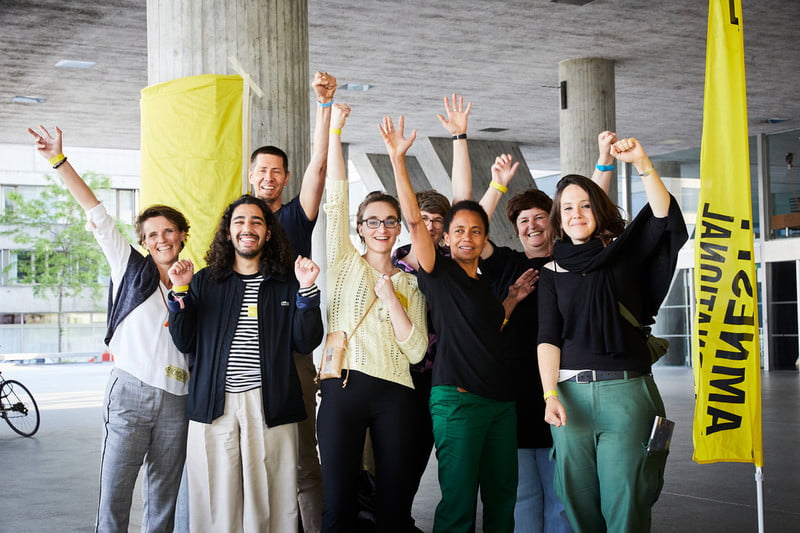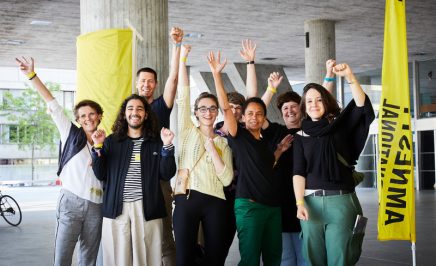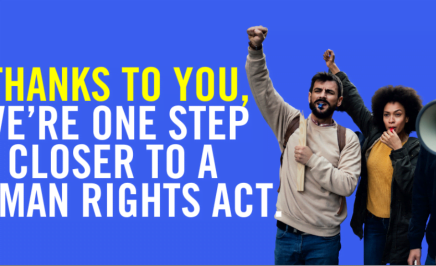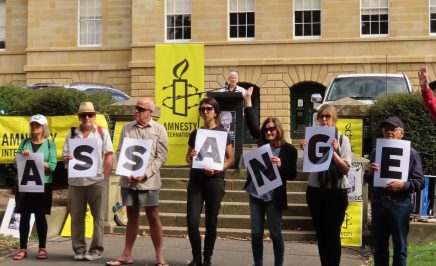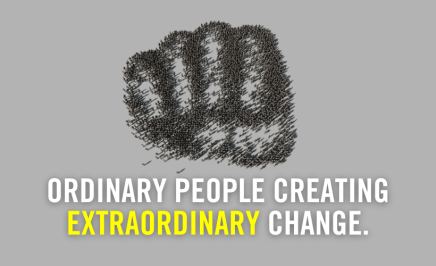We’re a truly people powered movement of 10 million people across 150 countries and territories who come together to challenge injustice. Together, in the last six months, we’ve celebrated more than 39 human rights wins across the globe.
Here in Australia, you have continued to campaign for Indigenous justice, support people seeking safety to rebuild their lives, and respond to crises, whenever and wherever they occur.
Individuals at Risk
Julian Assange is Freed
Julian Assange landed in Australia on June 26, bringing the 14-year global campaign for his freedom to an end. Jennifer Robinson, a human rights lawyer, barrister, and long-standing member of the legal team defending Julian Assange, told us that Amnesty’s campaign, which included all 125,000 of you in Australia, has had a ‘huge impact’. We handed over every one of your signatures to the US consulate, adding up to more than 400,000 globally.
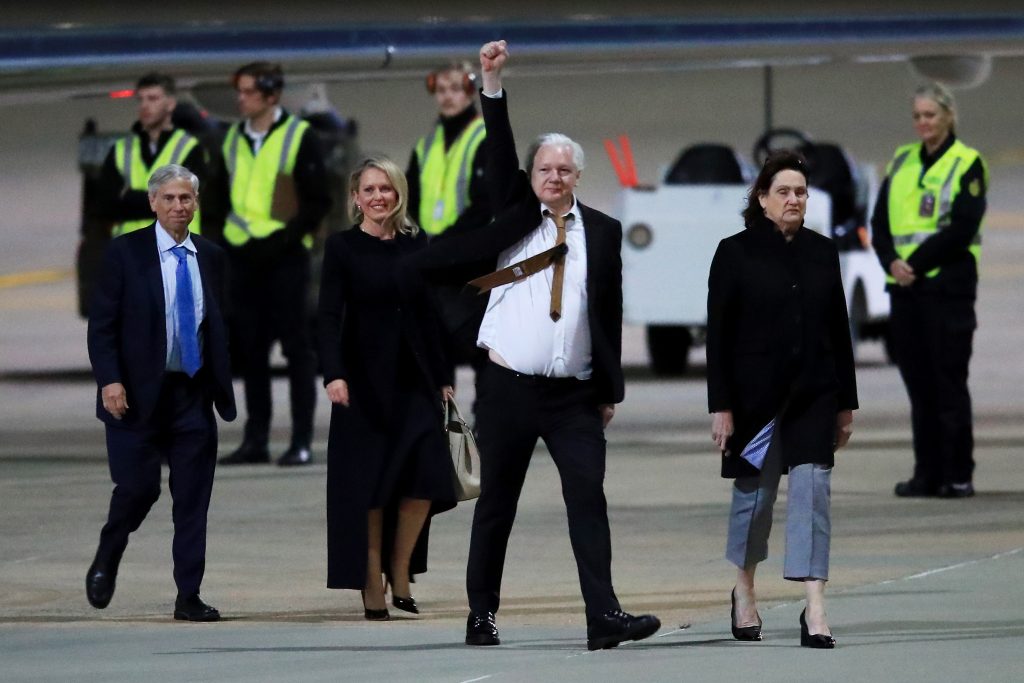
Our movement held events, attended protests, tweeted, called their local members of parliament and emailed the US Embassy. Thank you for being a part of the relentless fight for Julian’s freedom. You demonstrated that people power really does work.
Rita Karasartova has been acquitted
Last year we wrote to you about Rita Karasartova who, alongside 26 others, was arrested for opposing a new border agreement that gave control of a freshwater reservoir to Uzbekistan. Rita was charged with attempting to “violently overthrow the government”, which carries a maximum sentence of 15 years’ imprisonment.
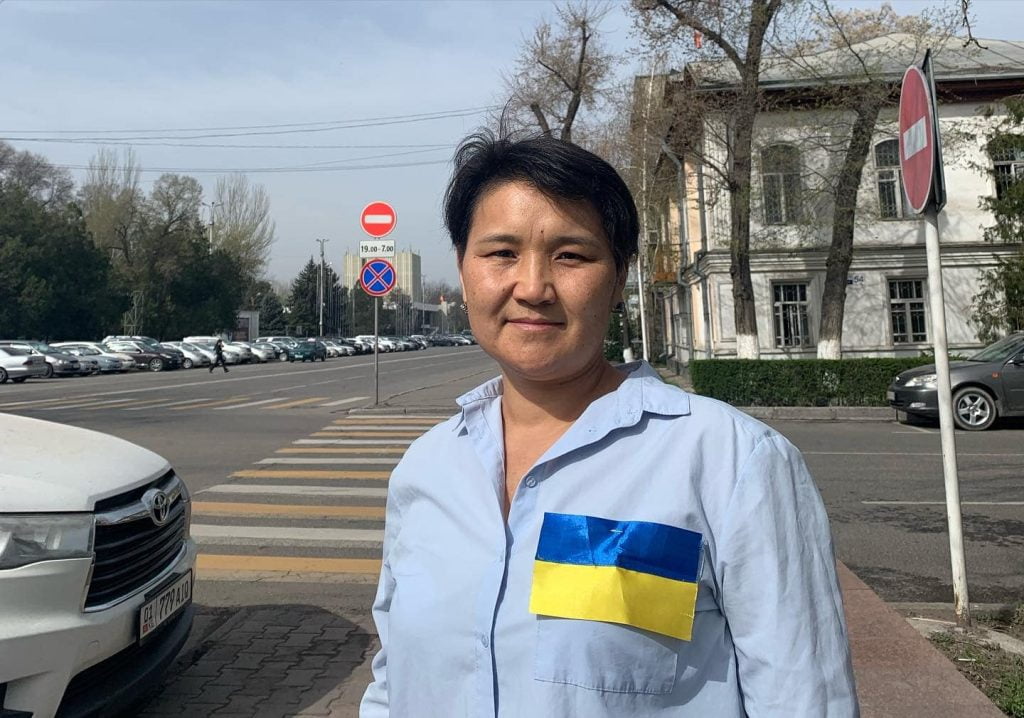
After 6,676 Amnesty supporters in Australia took action, Rita was finally acquitted in June. She wrote this message of thanks to everyone who supported her:
“I would like to express my huge huge gratitude to the Amnesty team!
Your timely actions – these letters, petitions, signatures, and the huge
number of letters that went to the court, that went to the prosecutor’s
office – it was all very powerful. In fact, it was very empowering to us
all. I realized every time I opened the envelopes and read the letters,
how powerful solidarity was.”
A glimmer of hope for Hoo Yew Wah
Hoo Yew Wah’s sentence of imprisonment for natural life has been commuted to 30 years imprisonment, in a long-awaited moment in the Federal Court of Malaysia,
He was arrested on 31 March 2005 when he was just 20 years old, after he was found in possession of 188.35 grams of methamphetamine. His case was riddled with human rights violations, and yet was sentenced to death for drug trafficking. After almost two decades in prison, this is a glimmer of hope for Hoo Yew Wah and his family to soon be reunited again.”
“Our global campaign for Hoo Yew Wah has witnessed overwhelming support from around the world, with over 200,000 people joining the call for the commutation of his death sentence. Today’s positive outcome in his case is a reminder that there is global support for the abolition of the death penalty, and that human rights change is always possible through collective action.”
Amnesty International Malaysia’s Executive Director, Katrina Jorene Maliamauv
Around the World
A historic vindication of Palestinians’ rights
Thanks to your support, when the crisis escalated in the Occupied Palestinian Territories and Israel, Amnesty’s researchers, fieldworkers and campaigners were able to act fast, gathering evidence and advocating for an immediate and ongoing ceasefire. Amnesty research has been cited by South Africa at the International Court of Justice and by Special Rapporteur Francesca Albanese in her report to the Human Rights Council.
Recent months have seen crucial developments in international law seeking justice for more than two million civilians who, over the last ten months, have and continue to experience the worst of humanity.
In an historic vindication of Palestinians’ rights, the International Court of Justice (ICJ) declared Israel’s occupation of Palestinian Territories unlawful in July. This landmark ruling underscores the urgency for global action against the brutal occupation of Gaza, the West Bank and East Jerusalem, the 17 year siege on Gaza and the continued building of illegal settlements – and the need for Australia to take a stand. The occupation is enabled by a system of oppression and domination – the crime against humanity of apartheid – which Amnesty determined in 2022.
Earlier in May, the ICJ ordered Israel to halt its military offensive in Rafah and outlined in that no uncertain terms; any ongoing military action could constitute an underlying act of genocide. This came only days after the International Criminal Court applied for arrest warrants for senior Israeli and Hamas leaders for war crimes and crimes against humanity. These positive breakthroughs would not have happened without millions of people across the world calling for a ceasefire and pushing their governments to apply international pressure.
Our latest report on Sudan
In July, Amnesty International’s new investigation found that foreign weapons are being imported in large quantities into Sudan, fuelling relentless civilian suffering. Our researchers analysed more than 1,900 shipment records and digital evidence – including approximately 2,000 photos and videos – identifying recently manufactured arms and ammunition from a range of countries including China, Russia, Serbia, Turkey, the United Arab Emirates and Yemen. The full report details how these weapons are not only fuelling violence, but are also enabling grave violations of international humanitarian law, including war crimes. In just days time, Amnesty’s Sudan team will be presenting your petition signatures during their advocacy visit, calling on the UN Security Council to extend the existing arms embargo beyond Darfur to the rest of Sudan.
Refugee Rights
“Thanks to your support, I recently had the opportunity to participate in the international consultations with the CRCP and UNHCR NGOs in Geneva.”
Attending these consultations as a person with lived experience and representing an international human rights organisation filled me with a sense of pride and responsibility. This privilege is inaccessible to millions of refugees, making it crucial for me to advocate for this highly vulnerable population. Over 340 delegates from 44 countries participated in the Consultations on Resettlement and Complementary Pathways
(CRCP), including representatives from NGOs, refugee-led organisations, UN and intergovernmental bodies, private sector organisations, and academic institutions. I provided an update on Amnesty International Australia’s Global Refugee Forum pledge and our domestic campaign to increase Australia’s refugee intake, focusing on Rohingya refugees from Bangladesh, Afghan refugees in Pakistan, Iran, and neighbouring countries.
During the UNHCR NGO consultations, I expanded my network with UNHCR staff and people on the ground who are assessing refugee claims and providing protection to refugees in camps and urban areas.
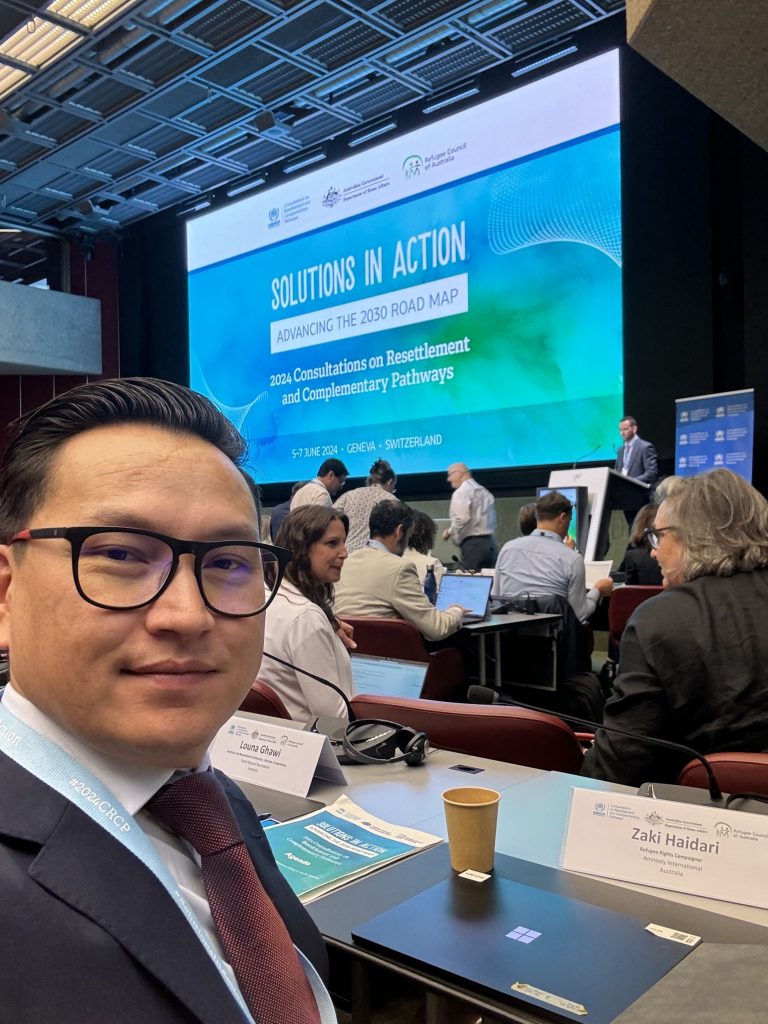
I raised issues concerning Rohingya refugees in Cox’s Bazar, Afghan refugees, and West Papuan refugees in PNG. We joined NGOs from 26 countries to call on states to expand their refugee intake to address the current global refugee displacement. This lifeline is crucial for refugees at greatest risk in host countries, particularly LGBTQI+ refugees in countries where same-sex intimacy is criminalised, women and girls experiencing sexual and gender-based violence, people with disabilities and complex health needs, and other refugees facing imminent danger.
Thank you for your continued support.
Zaki Haidari, Refugee Rights Campaigner
Indigenous Justice
A road trip on Larrakia Country
The Northern Territory election is less than two weeks away. Amnesty’s Indigenous Justice team is currently on a road trip throughout the territory – visiting communities, listening to the voices of First Nations peoples, shining a light on community-led alternatives to prison and calling on the government to ensure the protection and empowerment of First Nations children. You can find out more about the campaign in the latest Community Is Everything monthly newsletter – a celebration of First Nations films, music, books, businesses, mob who inspire us and more.
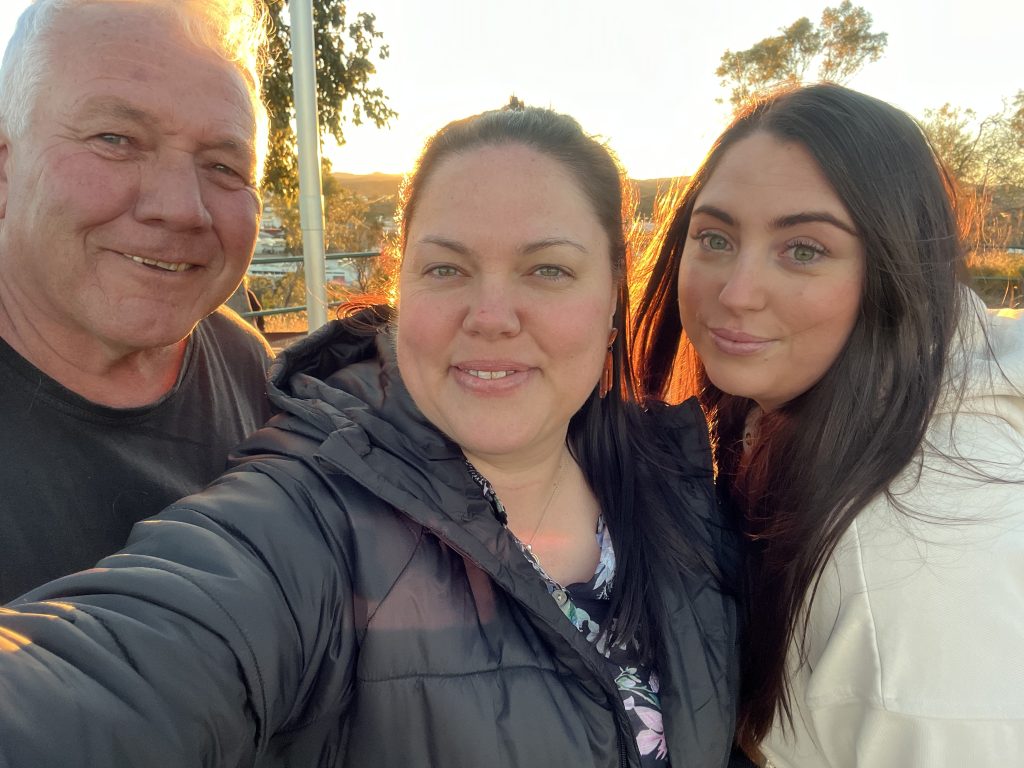
Human Rights Act
We’ve taken a significant step closer
On May 31, the Parliamentary Joint Committee on Human Rights recommended the Federal Government legislate a Human Rights Act. When we presented at the inquiry, the Committee noted that thousands of you sent submissions calling for the government to protect human rights in our federal laws – proving again that when you speak out, people in power listen. The housing crisis, a broken aged care system and the impacts of climate change all illustrate why we need a Human Rights Act so that people can take action when their rights are abused. Now, we’re calling on the Albanese government to accept the Committee’s recommendation and commit to the legislation of a Human Rights Act before the election. To do that, we need to show the government that people like you want a Human Rights Act over the coming months. Take action, and tell the Albanese government you want a future where people can right wrongs with a Human Rights Act today. Without it, powerful people can abuse human rights with no consequences.
